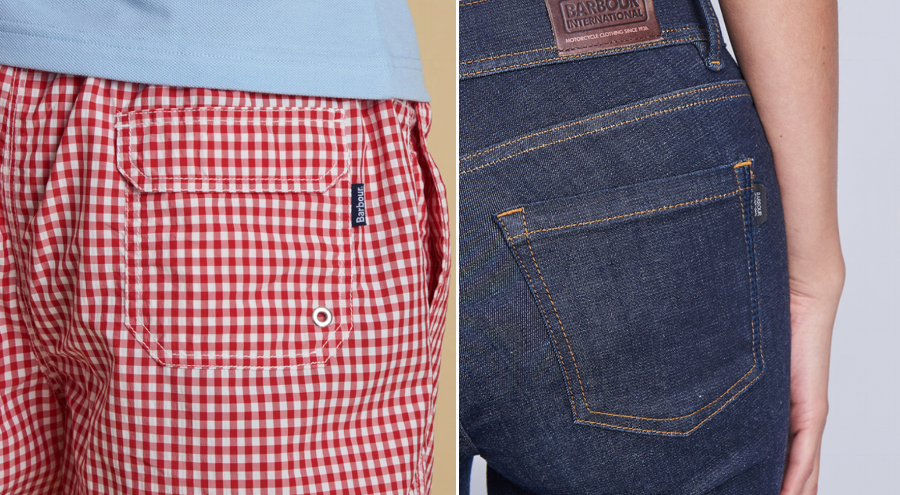You know how adidas gets a lot of flak for its aggressive attempts to prevent other companies – sportswear and non-sportswear ones, alike – from using three stripes, so much so that serial copycat Forever 21 filed a lawsuit of its own calling the company a “bully”? Well, Levi Strauss appears to be busy making something of a similar name for itself. However, instead of trying to keep others from using stripes, Levi’s is taking issue with an array of apparel brands’ use of small tabs on their clothing.
Levi’s has long-held federal trademark rights in its “famous Tab Device Trademark,” the little red, or white, or blue tab that bears the company’s name and is stitched into the right seam of the back pocket. The brand says the tab was originally designed in 1936 in order to provide “sight identification of its products in a crowded denim market.”
Over 80 years later, Levi’s is still using the tab and in furtherance of its effort to “safeguard the defining features on its jeans,” Levi’s has filed lawsuits against hundreds of brands, including Kenzo and Vineyard Vines. Most recently, the San Francisco-based denim brand decided to take on Barbour for using a “confusingly similar” version of its little blue tab, “a piece of fabric bearing the ‘Barbour’ name and typically affixed to the seam of the pocket of the garment,” which the British apparel stalwart calls the “Barbour flag.”
According to a lawsuit that was actually filed by Barbour in a New York federal court on Friday, “on May 22, 2018, Levi Strauss & Co. sent a cease and desist letter to Barbour that alleged that all garments with the Barbour flag were ‘infringing products,’” and demanded that within 10 days, Barbour immediately cease all sales of garments bearing the small tab.
Barbour, which got its start in the UK in 1894, asserts that Levi’s cease and desist “letter is a classic example of severe overreaching by a company that has the dubious distinction of being one of the world’s biggest trademark ‘bullies.’” To be specific, Barbour claims that Levi’s “is one of the most litigious apparel companies in the United States, if not the world. It has a well-deserved reputation as a trademark “bully,” having filed more than 300 trademark lawsuits since 1989.”
The company “is infamous for suing companies over the ‘pocket tab,’ the ‘arcuate’ stitching, and the leather patch, in which it claims to own rights,” the complaint continues.
 Garments bearing the “Barbour flag”
Garments bearing the “Barbour flag”
Still yet, Barbour, which says it has been using its flag tab for nearly 20 years, argues that the “factual allegations and legal assertions [in Levi’s letter] are baseless and hopelessly flawed,” at least in part because Levi’s “Tab Marks do not appear to be strong, ‘famous,’ or ‘well-known to consumers as an indicator of the LEVI’S® brand.’”
Instead of the small tabs serving as an identifier of the Levi’s brand for consumers who see them, Barbour claims that is not the case since “the marketplace is awash with apparel and related accessories featuring a ‘tab’ or ‘tab-like’ fabric affixed to the seam of a pocket or in that same general vicinity.” To prove its point, Barbour includes numerous examples of brands, including Facconable, H&M, Vans, Volcom, Paul Smith, Stussy, and Carhartt, among others, that make use of small tabs on their apparel.
Barbour also claims that “the parties’ respective flags and tabs are plainly different,” and as a result, its use of the Barbour flags is unlikely to create a substantial likelihood of confusion as to the source of these products and/or the relationship between Barbour and Levi’s, as Levi’s claims in its letter.
According to Barbour, since its flags have the word “Barbour” clearly printed on them, “it is hard to conjure up a situation where consumers would be ‘confused’ or ‘deceived’ into thinking the Barbour flags in any way relate to Levi’s.’”
In fact, Barbour states, “No reasonable and prudent consumer would ever mistakenly believe that these Barbour-branded products are somehow connected with, affiliated with, or sponsored by Levi’s,” and that in all of the years that Barbour-branded products have been sold, “there has never been a single instance where a consumer or potential consumer has expressed any such confusion [to Barbour] between its products and those offered by Levi’s.”
Barbour has asked the court to declare that its Barbour flag-bearing garments are not infringing Levi’s tab trademark, and that Barbour is not “otherwise violating any legitimate trademark rights owned or possessed by Levi’s,” and as a result, that Levi’s does not have a case for trademark infringement or dilution.
A representative for Levi Strauss & Co. told TFL, “At Levi Strauss & Co., our trademarks are one of the company’s most valuable assets, and we work actively to protect our trademark rights. As this is an ongoing legal matter, we are not in a position to comment on the specific allegations.”
* The case is Barbour Inc. et al v. Levi Strauss & Co., 1:2018-cv-05195.














